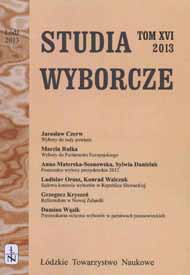SĄDOWA KONTROLA WYBORÓW W REPUBLICE SŁOWACKIEJ I JEJ LEGISLACYJNE PERSPEKTYWY
JUDICIAL CONTROL OF ELECTIONS IN THE SLOVAK REPUBLIC AND ITS LEGISLATIVE PERSPECTIVE
Author(s): Konrad Walczuk, Ladislav OroszSubject(s): Politics / Political Sciences
Published by: Łódzkie Towarzystwo Naukowe
Keywords: Sąd Konstytucyjny; kontrola wyborów; skargi wyborcze; Republika Słowacka
Summary/Abstract: In the modern constitutional state the mechanism of elections to the representative bodies serves a unique function. That is why the electoral judiciary is such important institution. In Slovakia the most important part of that kind of judiciary has been assigned to the Constitutional Court (CC), which has the power to rule on the constitutionality and legality of all (5) present in Slovakia types of elections. In terms of the number of judgments of the CC those of election complaints occupy the second position. The most numerous complaints are those against the municipal elections to the local government bodies, and their number is continously growing. The concentration of electoral judiciary in the hands of the body which has a specific, guaranteed by the Slovak Constitution position in the judicial system has numerous advantages. However, this concentration has its weaknesses, related primarily to the question of whether CC is able to guarantee the settlement of those cases within a reasonable period of time. The answer to this question must take into account not only the overall (growing) number of constitutional complaints brought before the CC with the specific dispute about them, but also the quantitative and qualitative parameters of the rest of his judicial functions. Establishing a deadline for resolving electoral complaints by the CC we consider as only formal way to solve it, not having a systemic nature and not related to the significance of the problem of “timeliness”. A balanced solution could continually leave all current powers of CC in election complaints, but with the difference that predicating on elections to the bodies of local selfgovernment would be entrusted to the CC adjudicating panels/formation (not plenum) and only the matters relating to other elections would still be the responsibility of the plenum of the CC. In this way, the largest settlement of electoral matters would be left to 4 “adjudicating bodies” (there are now four triple panels in the CC), which with no doubt would lead to the acceleration of proceeding and adjudicating on complaints of election.
Journal: Studia Wyborcze
- Issue Year: 2013
- Issue No: 16
- Page Range: 77-91
- Page Count: 15
- Language: Polish

